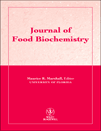
JOURNAL OF FOOD BIOCHEMISTRY
Scope & Guideline
Illuminating the Intersection of Food and Biochemistry
Introduction
Aims and Scopes
- Biochemical Characterization of Food Components:
The journal publishes studies that investigate the biochemical properties, structures, and functions of various food components, including proteins, carbohydrates, lipids, and phytochemicals. - Food-Nutrition Interactions:
Research exploring how food components interact with biological systems, affecting metabolic processes, health outcomes, and disease prevention is a core focus area. - Functional Foods and Nutraceuticals:
The journal emphasizes studies on functional foods and nutraceuticals, highlighting their health benefits and mechanisms of action, particularly in relation to chronic diseases. - Food Processing and Preservation Techniques:
Papers detailing innovative food processing methods, preservation techniques, and their effects on the nutritional and sensory properties of food are prevalent. - Microbiota and Gut Health:
Research emphasizing the impact of dietary components on gut microbiota and overall health, including the role of probiotics and prebiotics, is a significant area of interest. - Impact of Environmental Factors on Food Quality:
Studies examining how environmental factors, such as climate change and agricultural practices, influence food quality and safety are increasingly relevant.
Trending and Emerging
- Bioactive Compounds and Health Benefits:
There is a rising trend in research investigating the health benefits of bioactive compounds found in food, particularly their roles in disease prevention and health promotion. - Metabolomics and Food Chemistry:
Studies utilizing metabolomics to analyze food composition and its effects on human health are increasingly prominent, showcasing the integration of advanced analytical techniques. - Gut Microbiome Research:
Research on the interplay between diet, gut microbiota, and health outcomes is expanding, with a focus on how food components influence microbiome composition and function. - Functional Food Development:
The development of functional foods targeting specific health conditions, such as obesity, diabetes, and inflammation, is gaining traction, reflecting consumer interest in health-oriented diets. - Sustainable Food Practices:
Emerging research on the sustainability of food production and processing methods, including the impact of environmental changes on food biochemistry, is becoming increasingly relevant. - Food Safety and Preservation Innovations:
Innovations in food safety, including the use of natural preservatives and novel packaging technologies to enhance shelf life and reduce spoilage, are trending topics.
Declining or Waning
- Traditional Food Processing Techniques:
Research on traditional food processing methods has decreased, possibly due to the growing interest in modern, sustainable processing techniques that enhance food quality and safety. - Basic Nutritional Studies:
There is a noticeable decline in studies focused solely on basic nutritional content analysis, as the field moves towards more complex interactions between food components and health. - Single Component Studies:
Research concentrating on the effects of single food components in isolation is waning, with a trend towards holistic approaches that consider food matrices and their interactions.
Similar Journals
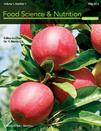
Food Science & Nutrition
Unveiling the science behind food for better health.Food Science & Nutrition is an esteemed peer-reviewed journal published by WILEY, dedicated to advancing the fields of food science and nutritional research. With an impressive impact factor and a prestigious Q1 ranking in the Food Science category, this journal stands out as a leading platform for innovative research, offering meaningful insights into the relationship between food composition and health outcomes. Since its transition to Open Access in 2013, Food Science & Nutrition has championed the global dissemination of knowledge, ensuring that vital research is accessible to researchers, professionals, and students alike. With a vast scope that encompasses both agricultural and biological sciences, the journal provides a comprehensive view of emerging trends, methodologies, and applications in food security and nutrition, making it indispensable for those invested in these critical areas.

FOOD SCIENCE AND BIOTECHNOLOGY
Pioneering Discoveries in Food Science and MicrobiologyFOOD SCIENCE AND BIOTECHNOLOGY, published by the Korean Society of Food Science & Technology (KOSFOST), stands as a prominent peer-reviewed journal dedicated to advancing knowledge in the fields of food science, biotechnology, and applied microbiology. With ISSN 1226-7708 and E-ISSN 2092-6456, this journal serves as a pivotal platform for disseminating high-impact research from South Korea and beyond, reflecting a robust Q2 ranking in multiple categories including Applied Microbiology and Biotechnology, Biotechnology, and Food Science as of 2023. The journal's influence is further emphasized by its positions in various Scopus ranks, where it showcases a commendable percentile ranking in Agricultural and Biological Sciences and Biochemistry. Although access options remain limited, the journal’s objectives revolve around the publication of innovative research, fostering interdisciplinary collaboration, and facilitating the exchange of ideas among a diverse community of researchers, professionals, and students. Whether you are involved in food technology, microbial biotechnology, or nutritional sciences, FOOD SCIENCE AND BIOTECHNOLOGY are instrumental in shaping the future of these critical fields, propelling advancements that enrich our understanding of food systems and health.

International Food Research Journal
Bridging Disciplines in the World of Food ResearchThe International Food Research Journal, published by UNIV PUTRA MALAYSIA PRESS, serves as a pivotal platform for disseminating innovative research within the field of food science. With an ISSN of 1985-4668 and an E-ISSN of 2231-7546, the journal has successfully established its presence since its inception in 2007, converging its findings through 2024. This esteemed journal holds a Q3 ranking in Food Science, illustrating its valuable contributions to the field as demonstrated by its Scopus rank of 276 out of 389, placing it in the 29th percentile among its peers in Agricultural and Biological Sciences. Although it operates under a traditional publishing model, its academic integrity and focus on high-quality research ensure that it remains a vital resource for researchers, professionals, and students eager to explore advances in food technology, nutrition, and safety. By encouraging interdisciplinary collaboration and critical dialogue, the International Food Research Journal plays an essential role in shaping the future of food science research.

Food Production Processing and Nutrition
Transforming food systems for public health excellence.Food Production Processing and Nutrition, published by SpringerNature, stands at the forefront of advancing knowledge in the vibrant fields of food science, nutrition, and public health. This esteemed Open Access journal, operational since 2019, plays a pivotal role in disseminating breakthrough research that intersects food production processes with nutritional insights, making it an invaluable resource for researchers, professionals, and students alike. With a commendable 2023 impact factor reflecting its robust scholarly contributions — Q1 in Food Science and Q2 in both Nutrition and Dietetics and Public Health, Environmental and Occupational Health — the journal not only emphasizes the importance of innovative food processing methods but also addresses pressing nutritional challenges faced globally. Located in the United Kingdom, it claims an impressive Scopus ranking, with a notable percentile standing across various categorical metrics. As such, Food Production Processing and Nutrition is essential for anyone aiming to deepen their understanding of how food systems impact public health through effective processing and nutritional strategies.
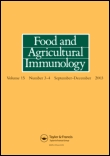
FOOD AND AGRICULTURAL IMMUNOLOGY
Transforming Agriculture with Immunological DiscoveriesFOOD AND AGRICULTURAL IMMUNOLOGY, published by Taylor & Francis Ltd, is a distinguished journal dedicated to the intersection of immunology and agricultural sciences, providing valuable insights in areas such as food safety, plant health, and disease resistance since its inception in 1989. Operating as an Open Access journal since 2017, it offers researchers and professionals unrestricted access to groundbreaking studies and reviews that advance the understanding of immunological responses in agricultural contexts. With its current quartile rankings of Q2 in Agronomy and Crop Science and Q3 in Food Science, as well as Q4 in Immunology, the journal has established itself as a vital resource for those aiming to enhance the quality and safety of food production through innovative research. By leveraging its impressive Scopus rankings across various categories, the journal promotes interdisciplinary collaboration and knowledge dissemination pertinent to both scientists and policymakers engaged in the agricultural and food sectors.
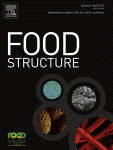
Food Structure-Netherlands
Pioneering Sustainable Practices in Food ScienceFood Structure-Netherlands, published by Elsevier, stands at the forefront of research in the fields of Applied Microbiology and Biotechnology, Bioengineering, and Food Science. With its ISSN 2213-3291 and a commendable position in the 2023 Q1 category rankings, this journal serves as a vital platform for scholars and professionals seeking to explore the innovative intersections of food structure and its multifaceted applications. The journal has garnered significant recognition, ranking 67th in Food Science and 36th in Applied Microbiology and Biotechnology, placing it in the top echelons of its field with 82nd and 72nd percentiles, respectively. Spanning years from 2014 to 2024, Food Structure-Netherlands aims to disseminate high-quality research that fosters the advancement of knowledge, promoting sustainable practices and technological innovations in the food industry. Researchers, professionals, and students will find this journal to be an invaluable resource for cutting-edge studies and emerging trends in food structure and functionality.

Food Frontiers
Connecting Researchers to Shape the Future of FoodFood Frontiers, an esteemed publication in the Food Science domain, is proudly published by WILEY. Launched as an Open Access journal in 2020, it aims to facilitate the dissemination of high-quality research that influences contemporary food science and technology. The journal, with an E-ISSN of 2643-8429, has rapidly ascended to a Category Quartile ranking of Q1 in the Food Science category as of 2023, and boasts an impressive Scopus rank of #31 out of 389 in Agricultural and Biological Sciences, placing it in the 92nd percentile. The journal's mission is to explore innovative approaches to food production, safety, and sustainability, making it an essential resource for researchers, industry professionals, and students eager to stay at the forefront of food science advancements. With a commitment to open accessibility, Food Frontiers fosters collaboration and knowledge sharing across the globe, addressing the critical challenges and trends in feeding the world sustainably.
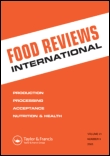
FOOD REVIEWS INTERNATIONAL
Championing Comprehensive Reviews in Food ScienceFOOD REVIEWS INTERNATIONAL, published by Taylor & Francis Inc, serves as a pivotal resource within the fields of Food Science and Chemical Engineering. Established in 1985, this esteemed journal offers a comprehensive platform for the dissemination of critical reviews that enhance understanding and innovation in the food industry. With an impressive impact factor reflecting its Q1 quartiles in both Food Science and Chemical Engineering categories, it ranks among the top journals in Scopus, securing the 24th spot in Agricultural and Biological Sciences. Scholars, researchers, and professionals are encouraged to explore its rich content, which spans meticulously reviewed articles that bridge academic research and practical applications, while contributing to advancements in food safety, processing, and sustainability. Although not an Open Access journal, access to its extensive repository is vital for anyone aiming to stay at the forefront of food science advancements.

Food Science and Human Wellness
Pioneering Insights for Wellness through Food ScienceFood Science and Human Wellness, published by TSINGHUA UNIVERSITY PRESS, is an esteemed open-access journal that has been at the forefront of advancing research in the interdisciplinary fields of food science and human health since its inception in 2012. With an impressive impact factor indicative of its quality and relevance, this journal holds a prestigious Q1 ranking in Food Science according to 2023 metrics, reflecting its commitment to high-caliber research and innovation. The journal is positioned within the top 12% of its category, ranked 46th out of 389 in Agricultural and Biological Sciences. The journal not only publishes original research articles but also critical reviews, perspectives, and innovations that contribute significantly to our understanding of the relationship between nutrition, wellness, and food science. With its Open Access model, Food Science and Human Wellness ensures that its valuable content is available to a global audience, fostering collaborative advancements in this vital field. Researchers, professionals, and students are invited to explore insightful discussions and impactful studies that aim to enhance public health and food safety.
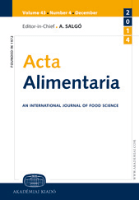
ACTA ALIMENTARIA
Championing research excellence in the food industry.ACTA ALIMENTARIA is a renowned journal in the field of food science, published by AKADEMIAI KIADO ZRT, based in Hungary. Since its inception in 1973, it has served as a vital platform for disseminating high-quality research on food chemistry, microbiology, nutrition, and technology, contributing significantly to the advancement of knowledge in the agricultural and biological sciences. Currently classified in the Q3 quartile of the 2023 Food Science category, the journal is positioned to address pressing issues pertaining to food safety, quality, and sustainability, making it an invaluable resource for researchers, professionals, and students alike. Although it does not currently offer open access, the journal maintains a strong reputation with a readership keenly interested in the latest developments in food science. With a Scopus rank placing it in the 38th percentile of its category, ACTA ALIMENTARIA continues to be a pivotal reference for those engaged in food research and innovation.